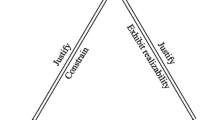Abstract
This article takes the view that both science, technology, society, environment (STSE) education and conventional forms of socio-scientific issues (SSI)-oriented science education are inadequate to meet the needs and interests of students faced with the demands, issues, and problems of contemporary life. A much more politicized approach is advocated, with major emphasis on social critique, values clarification, and sociopolitical action.
Résumé
Le point de vue de cet article est que ni l’enseignement des sciences, technologies et société, ni les formes traditionnelles d’enseignement des sciences orientées sur les questions socioscientifiques, ne sont en mesure de satisfaire aux besoins et intérêts d’étudiants qui sont aux prises avec les exigences et les problèmes de la vie contemporaine. Une approche beaucoup plus politisée est préconisée, mettant l’accent sur la critique sociale, la clarification des valeurs et l’action sociopolitique.
Similar content being viewed by others
References
Aikenhead, G. S. (2005). Research into STS science education. Educación Quimica, 16(3), 384–397.
Aikenhead, G. S. (2006). Science education for everyday life: Evidence-based practice. New York: Teachers College Press.
Curtin, D. (1991). Toward an ecological ethic of care. Hypatia, 6, 60–74.
Fuller, S. (1993). Rhetoric, and the end of knowledge: The coming of science and technology studies. Madison: University of Wisconsin Press.
Gallagher, J. J. (1971). A broader base for science education. Science Education, 55, 329–338.
Habermas, J. (1971). Knowledge and human interests. Boston: Beacon Press.
Hodson, D. (1994). Seeking directions for change: The personalisation and politicisation of science education. Curriculum Studies, 2, 71–98.
Hodson, D. (2003). Time for action: Science education for an alternative future. International Journal of Science Education, 25(6), 645–670.
Hodson, D. (2009a). Putting your money where your mouth is: Towards an action-oriented science curriculum [Online version]. Journal of Activist Science & Technology Education, 1(1), 1–15.
Hodson, D. (2009b). Teaching and learning about science: Language, theories, methods, history, traditions and values. Rotterdam, The Netherlands: Sense Publishers.
Hurd, P. D. (1998). Scientific literacy: New minds for a changing world. Science Education, 82(3), 407–416.
Jensen, B. B. (2002). Knowledge, action and pro-environmental behaviour. Environmental Education Research, 8(3), 325–334.
Jensen, B. B. (2004). Environmental and health education viewed from an action-oriented perspective: A case from Denmark. Journal of Curriculum Studies, 36(4), 405–425.
Kyle, W. C. (1996). Editorial: The importance of investing in human resources. Journal of Research in Science Teaching, 33, 1–4.
Levinson, R. (2010). Science education and democratic participation: An uneasy congruence? Studies in Science Education, 46(1), 69–119.
McCurdy, R. C. (1958). Towards a population literate in science. The Science Teacher, 25(7), 366–369, 408.
Millar, R., & Osborne, J. (Eds.). (1998). Beyond 2000: Science education for the future. London: King’s College.
Nashon, S., Nielsen, W., & Petrina, S. (2008). Whatever happened to STS? Pres-service physics teachers and the history of quantum mechanics. Science & Education, 17(4), 387–401.
Shen, B. S. P. (1975). Scientific literacy and the public understanding of science. In S. B. Day, (Ed.), The communication of scientific information (pp. 44–52). Basel, Switzerland: Karger.
Wellington, J. (2001). What is science education for? Canadian Journal of Science, Mathematics and Technology Education, 1(1), 23–38.
Zeidler, D. L., Sadler, T. D., Simmons, M. L., & Howes, E. V. (2005). Beyond STS: A research-based framework for socioscientific issues education. Science Education, 89(3), 357–377.
Zeidler, D. L., Walker, K. A., Ackett, W. A., & Simmons, M. L. (2002). Tangled up in views: Beliefs in the nature of science and responses to socioscientific dilemmas. Science Education, 86(3), 343–367.
Author information
Authors and Affiliations
Corresponding author
Rights and permissions
About this article
Cite this article
Hodson, D. Science Education as a Call to Action. Can J Sci Math Techn 10, 197–206 (2010). https://doi.org/10.1080/14926156.2010.504478
Published:
Issue Date:
DOI: https://doi.org/10.1080/14926156.2010.504478




